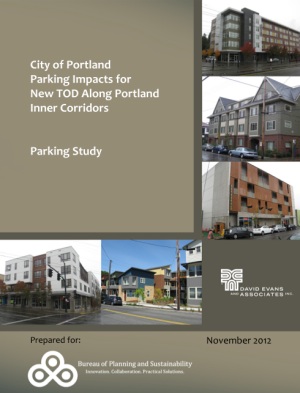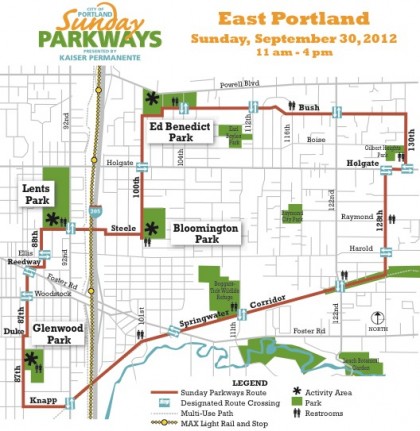
–Download PDF–
Last week, the City of Portland Bureau of Planning & Sustainability released their much-anticipated study (PDF) on the many new apartment buildings in Portland’s inner neighborhoods that have little or no on-site auto parking. Commissioned after neighborhood groups aired grievances about parking and other impacts to streets near the developments, the study offers actual data to explain what’s actually going on.
Back when this issue first came to light back in August, I penned an editorial urging the City to address the problem. Despite a forward-thinking Portland city code that doesn’t require builders to provide auto parking if they’re on a transit corridor, went my thinking, the fact remains that most people still own cars and need a place to put them. Turns out that there’s not as much of a “problem” as I thought.
The study found that 72% of residents surveyed (eight apartment buildings were analyzed) own at least one car. However, despite this rate of car ownership, the study found that there’s still plenty of on-street parking spaces available for them. An analysis of the on-street parking within two blocks of each building in the study showed that parking is “underutilized.”
But while the study pointed out that residents seem “reluctant” to give up their cars, a whopping 64% of them get to work by some other means than driving alone.
The top commute mode share numbers were:
1. Motor vehicle (single occupant) – 36 percent
2. Public transit – 23 percent
3. Bicycle – 20 percent
4. Walk – 9 percent
By comparison, City of Portland data shows that the citywide average for single-occupancy motor vehicle work trips is 59 percent. The bike mode share among residents in this study is also considerably higher than the Portland-wide average. (For non-work trips, the numbers change a bit, with 44% driving alone, 4% taking transit, 16% biking, and 20% walking.)
Here’s an excerpt from the study (emphasis mine):
“An important point to draw from these results is that 64 percent of residents are getting to work via a non-single-occupant vehicle. Almost a third (28 percent) of those surveyed belong to car-free households. This is notable higher than the 12 percent car-free average in Portland.”
That seems like a pretty big deal. Especially following a Metro travel survey released earlier this month that led The Oregonian to report that, “Despite significant investments in transit and bike systems, the overall number of trips taken in automobiles in the Portland metro area has barely decreased in the past two decades.”
The other thing that stood out for me in this study is that bike facilities and bicycling itself as a way to encourage even more people to give up their cars, was only given a passing mention. The report instead, focused mostly on how carsharing and better transit access could play a role in reducing car ownership rates.
As I maintained in my editorial on August 14th, if we actually offered residents better bikeways and higher quality bike parking many more of these apartment residents would be likely to sell their cars.
In their analysis of the eight buildings in the study, residents reported that half of them had poor bike parking facilities or lacked adequate bike parking capacity.
Even with the completion of this study, this issue isn’t likely to go away any time soon. Some neighborhood groups remain up-in-arms about the buildings, and now, Mayor-elect Charlie Hales’ call for moratorium on them has just been deemed legally “indefensible” by the City’s Chief Planner Joe Zehnder.
We desperately need to add density to our city, and adding more space for storage of automobiles is the wrong way to go. What’s happening with these apartments proves that with good neighborhood design and access to transit and biking, people will choose more sensible ways of getting around. We should encourage this even further by offering people high quality bike and transit access and considering some sort of pricing model for on-street car parking. We need the space and we need the money.
– Read more analysis of the study from Portland Afoot. A public forum on this issue is behind held at today’s Planning & Sustainability Commission Meeting from 12:30 to 3:30 at 1900 SW 4th Ave, Suite 2500A. You can also email comments directly to the commission at psc@portlandoregon.gov.

